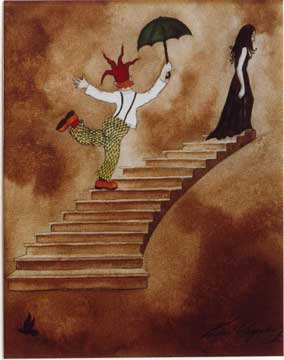Sorry for the delay; didn’t see the paging until I checked in a minute ago.  (No, I don’t have a degree, fwiw.)
(No, I don’t have a degree, fwiw.)
Re Origen and backsliding, strictly speaking he’s talking about formal apostasy under official persecution – a question that exercised Christian authorities before, during, and after his day. One sect got censured as unorthodox purely for refusing to accept back Christians who had apostasized under threat. During most of Origen’s time, the Imperial court was generally friendly to Christians – the Emperor Philip the Arab even converted to Christianity! (He was well-known by 4th century historians as the first Christian emperor, although Constantine’s importance as the first one to make Christianity a legal religion and to rule publicly as a Christian soon overshadowed him. Memory had not yet faded of the original Titus Flavius Clemens, either, who though not Emperor had ruled as co-regent with his cousin in the late 90s, and was martyred when the Emperor discovered he had converted. Clement of Alexandria, born soon afterward, was given his name in remembrance.)
Origen himself, though not a martyr (you have to die for that), died as a confessor, someone who refused to denounce the faith under governmental pressure; in his case this happened in the great persecution of Diocletian, who overthrew the prior Imperial family and (not too unexpectedly) launched the worst Imperial persecution in Christian history (probably as a side effect of undermining the previous family). Origen had been lauded as the greatest intellectual in Roman history, and so was spared the death sentence, but they broke most of his bones and he spent his final years shackled in stocks in prison. So in his final years, the question of accepting backsliders back into communion was sharper than ever.
As far as I know, what Origen meant was that those who apostasized could be accepted back into communion once but not twice. This wasn’t something someone usually had to guess about (although someone might obscure that they had done so, leading others to wonder if it had happened and to check references: Jason moves to a new town, petitions to join the church, acts like a new convert, but actually apostasized twice in Alexandria, which the new church might never hear about), it was a formal public issue. The people who did it would definitely know they had done it. I mean that there would be Roman governmental records proving that the person had renounced Christ, offered worship to the Emperor, maybe to more heavenly gods, maybe had given up scriptural books to be burned – a special detail of Diocletian’s persecution – maybe had narc’d on other Christians; consequently, he would be formally exempt from governmental persecution henceforth.
The penalty for permanent excommunication would be going into the eonian fire after death. However, Origen regarded the fire as remedial and instructional, so while anyone should have a respectful numinous fear of it, the properly humble and penitent should accept it. For those who continued impenitent, the fire would keep pace into the eons of the eons but it would eventually bring the penitent to convert (and once the last pentient converted, namely Satan, that would be the end of the eons: whether time continued or not, there would be no more transitional periods between one eon and another.) For those already penitent and following Christ, although outside communion technically, it wouldn’t be a problem per se, even though formal repentance wouldn’t be accepted until they entered the fire. (I’m fuzzier about whether Origen thought the fire was the Holy Spirit, but he certainly thought the operations were the same in the long run. His posthumous disciple Athanasius was a little more direct about it being the Holy Spirit, but still treated the modes of operation as completely distinct, which has historically contributed to most students thinking Ath wasn’t a Christian universalist since unlike Origen he didn’t talk about what happened after doers of injustice and the ungrateful went into the final fire; modern annihilationists sometimes treat him as one based on that lack of further discussion as well, and because Ath was very clear that sin leads the sinner into annihilation eventually, or would do so apart from the grace of God. I’m prepping a post summarizing Ramelli’s report on Ath from her Tome material, soon.)

 (No, I don’t have a degree, fwiw.)
(No, I don’t have a degree, fwiw.)